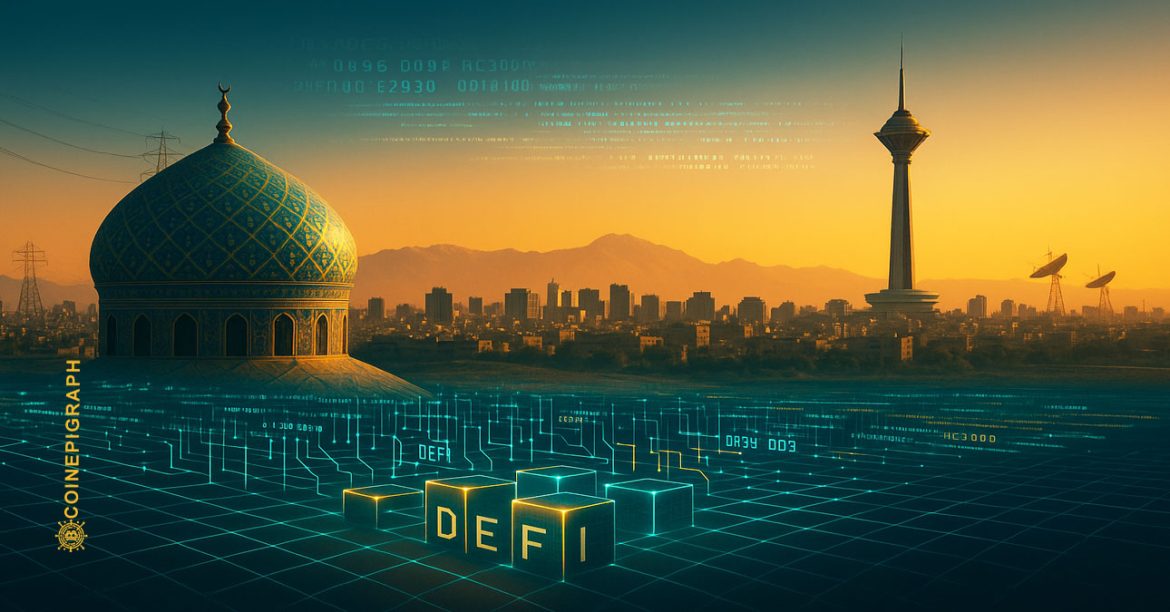By CoinEpigraph Editorial Desk | November 10, 2025
A Digital Economy by Design, Not by Default
Iran’s first international blockchain conference, deBlock 2025, opened this week with a declaration that caught global attention:
“Without digital assets, there is no digital economy.”
Senior Iranian officials and policy planners outlined a plan to grow the digital sector to 10 percent of GDP by 2030, using crypto assets, tokenisation, and blockchain infrastructure as foundational tools.
Unlike prior years, this was not rhetoric from the margins of government — it was the official stance of ministries responsible for economic strategy and technology development.
For a nation long isolated from global banking systems, crypto now represents connectivity without permission.
Crypto as a Tool of Economic Sovereignty
Iran’s interest in blockchain is not new, but the framing has shifted from tactical to structural.
In the 2018–2023 period, crypto mining was treated largely as a grey-market export activity — tolerated, taxed, then restricted amid energy shortages. But deBlock 2025 re-casts digital assets as strategic infrastructure.
Officials referenced three priorities:
- Cross-border settlements outside of SWIFT and dollar-clearing systems.
- Tokenised trade channels within the BRICS+ and Eurasian Economic Union blocs.
- Domestic asset digitalisation to reduce reliance on intermediaries and capital controls.
In short, Iran is building a digital shadow-banking network under the banner of national innovation.
A Regional Race for Crypto Relevance
Iran’s pivot mirrors moves by other sanction-pressured or dollar-alternative economies.
- Russia is testing blockchain-based trade settlements and digital-ruble pilots.
- China’s Belt and Road corridors are exploring blockchain logistics and CBDC interlinkages.
- Saudi Arabia and the UAE have integrated crypto and CBDC test environments under Project Aber.
Within this context, Iran’s ambition to become a regional crypto hub is as much diplomatic as it is technological — a gesture that signals alignment with BRICS and the Global South’s broader “de-dollarisation” narrative.
The Regulatory Balancing Act
Beneath the rhetoric of openness lies a practical tension.
Iran wants the innovation of crypto without the anarchy of unregulated markets.
Tehran has already:
- Legalised crypto mining with strict licensing.
- Proposed state-supervised exchanges.
- Drafted frameworks for on-chain KYC and transaction reporting.
The government’s pitch is simple: a “controlled permissionless system” — where blockchain is used for efficiency, but the state remains the anchor of trust.
To Western policymakers, this looks paradoxical. To Iran, it’s pragmatism redefined.
Energy, Infrastructure, and the Real-World Constraint
Iran’s mining industry has been both an opportunity and a liability. Abundant natural gas makes the country a cost-competitive mining hub, but rolling blackouts and grid stress have forced shutdowns.
Now, officials are promoting renewable-powered mining clusters and state-approved hosting zones, pairing energy strategy with digital ambition.
It’s a reminder that even in crypto, physical infrastructure still defines the boundary of possibility.
Regulatory and Geopolitical Implications
For the international community, Iran’s new direction raises three big questions:
- Sanctions Circumvention or Financial Evolution?
- The U.S. and EU may interpret crypto-based settlement systems as sanctions evasion.
- Yet Iran’s argument is that digital finance provides inclusion — not concealment.
- A New Template for Restricted Economies?
- If Iran succeeds in architecting a regulated crypto economy, other restricted or developing nations may emulate it.
- Global Policy Response
- Expect renewed debate at FATF and IMF forums over how far crypto infrastructure can expand outside Western regulatory reach.
The irony is clear: regulation’s frontier is being re-drawn by those long excluded from it.
The Editorial View
Iran’s digital-economy pivot isn’t about speculation — it’s about sovereign adaptation.
Where access to finance ends, programmability begins.
If executed, Tehran’s experiment could redefine how nations in the geopolitical periphery harness blockchain not just to survive sanctions, but to prototype a parallel financial architecture.
The world’s regulators may view it as defiance.
Iran calls it design.
At CoinEpigraph, we are committed to delivering digital-asset journalism with clarity, accuracy, and uncompromising integrity. Our editorial team works daily to provide readers with reliable, insight-driven coverage across an ever-shifting crypto and macro-financial landscape. As we continue to broaden our reporting and introduce new sections and in-depth op-eds, our mission remains unchanged: to be your trusted, authoritative source for the world of crypto and emerging finance.
— Ian Mayzberg, Editor-in-Chief
The team at CoinEpigraph.com is committed to independent analysis and a clear view of the evolving digital asset order.
To help sustain our work and editorial independence, we would appreciate your support of any amount of the tokens listed below. Support independent journalism:
BTC: 3NM7AAdxxaJ7jUhZ2nyfgcheWkrquvCzRm
SOL: HxeMhsyDvdv9dqEoBPpFtR46iVfbjrAicBDDjtEvJp7n
ETH: 0x3ab8bdce82439a73ca808a160ef94623275b5c0a
XRP: rLHzPsX6oXkzU2qL12kHCH8G8cnZv1rBJh TAG – 1068637374
SUI – 0xb21b61330caaa90dedc68b866c48abbf5c61b84644c45beea6a424b54f162d0c
and through our Support Page.
🔍 Disclaimer: CoinEpigraph is for entertainment and information, not investment advice. Markets are volatile — always conduct your own research.
COINEPIGRAPH™ does not offer investment advice. Always conduct thorough research before making any market decisions regarding cryptocurrency or other asset classes. Past performance is not a reliable indicator of future outcomes. All rights reserved | 版权所有 ™ © 2024-2029.





